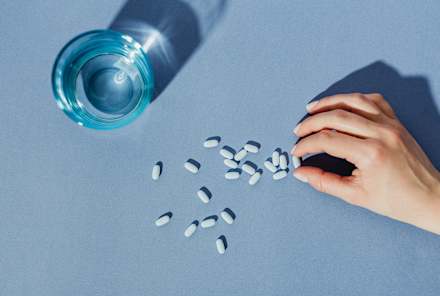Advertisement
Resveratrol Benefits: Everything You Need To Know About What This Antioxidant Can Do For You

1. It may reduce inflammation.
You've probably heard of resveratrol, an "antioxidant superhero" found in red wine, dark chocolate, grapes, and blueberries. It's been a topic of scientific inquiry for years; and today, it's believed to be one of the most potent polyphenols1 and strongest protectors against symptoms associated with aging and free radical damage out there. In other words: It works hard to keep you healthy in the long-term.
And while its health benefits are no excuse to go out and drink as much red wine as you please (since alcohol can actually increase free radical production in the body), there's no doubt it has a ton of exciting properties worth learning about. Keep in mind that you should always talk to your doctor before adding any supplements to your routine—especially if you're suffering from a serious health condition like cancer or taking medications of any kind. Here are some of the exciting health benefits of resveratrol:
Studies have demonstrated resveratrol’s ability to suppress the expression and activity of enzymes tied to inflammatory responses 2that damage tissue throughout the body. Meaning, it might be able to help with chronic inflammation and an overactive inflammatory response, which is the hallmark of autoimmune disease. Chronic low-grade inflammation also contributes to many other illnesses, including heart disease.
Summary
2. It may help treat diabetes.
Proper insulin production is vital as you age, especially in an effort to avoid type 2 diabetes. Not only does resveratrol help to lower overall insulin levels3, but it may also increase insulin sensitivity, which can help prevent a host of complications often associated with diabetes. One explanation for how resveratrol works is that it may stop a certain enzyme from turning glucose into sorbitol4, a sugar alcohol. When too much sorbitol builds up in people with diabetes, it can create cell-damaging oxidative stress.
Interestingly, resveratrol also has positive effects on brain-derived neurotrophic factor (BDNF)5, which is involved in the pathogenesis of obesity, type 2 diabetes, and metabolic syndrome. Researchers have observed that BDNF levels are lower in people with type 2 diabetes mellitus and other insulin-related problems.
3. It helps optimize cellular function.
The mitochondria are the energy centers of the cells, helping to optimize whatever the cellular function of an individual cell may be. Many experts think that when mitochondrial function is enhanced, it will lead to healthier cellular function and a person will experience increased energy levels.
4. It fends off aging free radicals.
High levels of oxidative stress affect every organ and system in the body and has been linked to everything from Alzheimer's disease, arteriosclerosis, cancer, and heart disease to accelerated aging, asthma, diabetes, and leaky gut syndrome. Oxidative stress is believed to lead to the development of the most prevalent chronic diseases and disorders killing adults today, especially heart disease, cancer, and diabetes. As a strong polyphenol, resveratrol may have therapeutic uses1, meaning it could be used in actual medical treatments in the future to fight free radicals and oxidative stress.
5. It helps optimize blood circulation.
Resveratrol keeps circulation flowing smoothly6, preventing arterial damage and offering protection in the brain from memory loss and conditions including Alzheimer's disease. It may also prevent other disorders, such as stroke, ischemia, and Huntington's disease.
6. It may mitigate autoimmune disease.
Because it controls the release of pro-inflammatory molecules, resveratrol might benefit those with an autoimmune disease7 or help prevent one from occurring in the first place. It also seems to positively alter gut microbiota and influences stem cells and their ability to divide and multiply, which are both associated with better overall health.

7. It's anti-carcinogenic.
Resveratrol also helps regulate apoptosis, which is a highly important process in the body that destroys old or harmful cells8, and therefore seems to have anti-cancer properties. Studies have found evidence of resveratrol triggering apoptosis of activated T-cells and suppressing the growth of tumors, in addition to acting against cancer.
In animal studies, resveratrol has been shown to fight several kinds of cancer cells9, including gastric, colon, skin, breast, and prostate. Resveratrol may inhibit cancer cell growth, too, by preventing cancer cells from replicating and spreading. It can change the gene expression in cancer cells to inhibit their growth, too.
8. It can reduce the risk of heart disease.
In a JAMA 10study10, resveratrol (in this case, from red wine) decreased the risk of heart disease and other common health concerns. A 2015 review concluded that high doses of resveratrol supplementation may help reduce systolic blood pressure11—when high, it's a risk factor for heart disease. Resveratrol also helps the body to produce more nitric oxide, which causes blood vessels to relax.
9. It can reduce blood cholesterol levels.
Resveratrol may influence cholesterol levels by reducing the effect of a cholesterol production-related enzyme12. As an antioxidant, resveratrol also may decrease the oxidation of "bad" LDL cholesterol—aka cholesterol that can contribute to fatty buildups in arteries, which increases the risk for heart attack, stroke, and peripheral artery disease.
10. It may lengthen your life span.
Well, it lengthened the life span of animals, at least. There's evidence that resveratrol activates certain genes13 that are thought to slow the aging process. It works to achieve this in the same way as calorie restriction, which has shown promise in lengthening life spans by changing how genes express themselves.
However, it's not clear if the compound would have a similar effect in humans. A review of studies exploring this connection found that resveratrol increased the life span of 60 percent of the organisms studied, but the effect was strongest in organisms that were less related to humans, such as worms and fish.
11. It can protect your brain.
Several studies have suggested that drinking red wine can help slow down age-related cognitive decline14. This may partly be due to the antioxidant and anti-inflammatory activity of resveratrol. It seems to interfere with protein fragments called beta-amyloids, which are crucial to forming the plaques that are a hallmark of Alzheimer's disease. Additionally, the compound may set off a chain of events that protects brain cells from damage.
U.K. researchers conducted a study of 22 healthy adults and determined that neurological blood flow was increased following resveratrol consumption. Before that study, Illinois researchers discovered that mice receiving resveratrol supplementation had better memory function and overall increased mental performance.

12. It may ease joint pain.
Arthritis is a common affliction that leads to joint pain and loss of mobility, and plant-based supplements are being studied as a way to treat and prevent joint pain. A 2011 study found that resveratrol, when taken in supplement form, may help protect cartilage from deteriorating. Cartilage breakdown can cause joint pain and is one of the main symptoms of arthritis. In one study, researchers injected resveratrol into the knee joints of rabbits with arthritis and found that these rabbits suffered less damage to their cartilage.
13. It may help your eyesight from fading.
A 2013 paper found that resveratrol has the ability to regulate angiogenesis15—the development of new blood cells—thereby preventing the abnormal growth of blood vessels that are damaging to eyesight.
14. It protects your skin from environmental stress.
If the gold standard of antioxidants in face serums was vitamin C, it's now sharing that spotlight with resveratrol. The antioxidant ability of resveratrol is known to be both potent and efficient. In fact, it has been shown to be greater than that of vitamins E and C. One study demonstrated16 that resveratrol was 95 percent efficient at preventing lipid peroxidation, compared to 65 percent for vitamin E and 3 percent for vitamin C. Dermatology researchers have even found that topical resveratrol possesses 17 times more antioxidant potency than idebenone, an expensive and powerful antioxidant drug used in certain anti-wrinkle creams.
15. It calms facial redness.
Applied topically, resveratrol helps protect the skin's surface and helps rebuff negative environmental influences17. It also has significant skin-calming properties that may help minimize the look of redness.
16. It boosts natural collagen production.
Resveratrol not only stimulates healthy cell proliferation but also supports synthesis of collagen18 by protecting the dermal matrix from harmful enzymes and improving the function of fibroblasts that create healthy collagen.
Want to learn about the pros and cons of alcohol for your health5?
18 Sources
- https://www.nature.com/articles/s41698-017-0038-6
- https://www.ncbi.nlm.nih.gov/pubmed/17897053
- https://www.ncbi.nlm.nih.gov/pubmed/28843911
- https://www.sciencedirect.com/science/article/pii/S2225411017301049
- https://www.ncbi.nlm.nih.gov/pmc/articles/PMC5316436/
- https://www.ncbi.nlm.nih.gov/pmc/articles/PMC4703409/
- https://www.ncbi.nlm.nih.gov/pmc/articles/PMC5748756/
- https://www.ncbi.nlm.nih.gov/pubmed/29723857
- https://www.ncbi.nlm.nih.gov/pmc/articles/PMC2083123/
- https://www.ncbi.nlm.nih.gov/pmc/articles/PMC5707662/
- https://www.ncbi.nlm.nih.gov/pmc/articles/PMC5835393/
- https://www.ncbi.nlm.nih.gov/pmc/articles/PMC2276147/
- https://www.ncbi.nlm.nih.gov/pmc/articles/PMC2546476/
- https://www.ncbi.nlm.nih.gov/pmc/articles/PMC4030174/
- https://www.ncbi.nlm.nih.gov/pmc/articles/PMC3703386/
- https://www.ncbi.nlm.nih.gov/pmc/articles/PMC5579659/
- https://www.ncbi.nlm.nih.gov/pubmed/28389713
- https://www.ncbi.nlm.nih.gov/pmc/articles/PMC4745978/
Watch Next
Enjoy some of our favorite clips from classes
Enjoy some of our favorite clips from classes
What Is Meditation?
Mindfulness/Spirituality | Light Watkins
Box Breathing
Mindfulness/Spirituality | Gwen Dittmar
What Breathwork Can Address
Mindfulness/Spirituality | Gwen Dittmar
The 8 Limbs of Yoga - What is Asana?
Yoga | Caley Alyssa
Two Standing Postures to Open Up Tight Hips
Yoga | Caley Alyssa
How Plants Can Optimize Athletic Performance
Nutrition | Rich Roll
What to Eat Before a Workout
Nutrition | Rich Roll
How Ayurveda Helps Us Navigate Modern Life
Nutrition | Sahara Rose
Messages About Love & Relationships
Love & Relationships | Esther Perel
Love Languages
Love & Relationships | Esther Perel


















